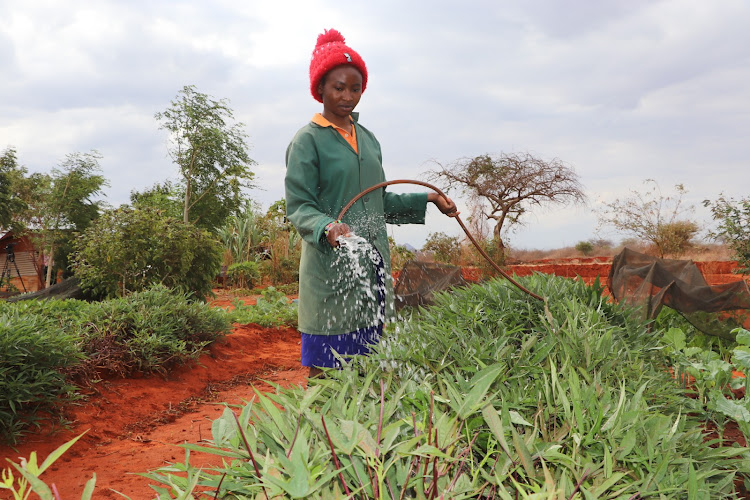Kitchen gardens are slowly gaining popularity in arid and semi-arid parts of Taita Taveta county.
Due to the continuous failed rainy seasons, farmers have turned to growing vegetables and sweet potatoes in their kitchen gardens to boost food security and nutrition, and combat climate change.
Farmer Jones Mlegwa, a fervent advocate for kitchen gardens, is among the farmers producing vegetables and sweet potatoes despite the harsh climatic conditions.
“I have set up a small garden outside my house where I grow a variety of vegetables, sweet potatoes, and sorghum,” Mlegwa told the Star during a visit to his Ndii home on Friday.
His well-maintained garden serves as a demonstration farm for the Mbulia farmers’ field school.
FFS is an agricultural peer learning methodology for extending knowledge and technology where groups of 25-30 farmers meet for field learning sessions under the guidance of a trained facilitator.
Some farmers have joined farmer field schools to learn about resilience measures.
Previously, Mlegwa said he hardly harvested anything from his four-acre farm due to poor rainfall recorded in the region over the years.
Unpredictable weather patterns occasioned by climate change have contributed to a decrease in agricultural productivity, nutrition, and food security in the region.
But when FFS method was introduced in the area three years ago, Mlegwa was quick to embrace it.
More than 240 farmers in the county have completed FFS training and are serving as trainers for other farmers in the community.
Farmer Sarah Mwemba, the chairperson of Magesho Mecha farmers’ group, said many small-scale farmers who embraced kitchen gardens have recorded increased production.
“We are being trained under the Agricultural Climate Resilient Enhancement Initiative project to increase productivity. More small-scale farmers are embracing the new farming methods,” she said.
According to the Food and Agriculture Organization of the United Nations (FAO), small-scale farmers produce at least 33 per cent of the world’s food, despite challenges including poverty, lack of training, and technology.
Paul Mutungi, the FAO lead farmer field schools’ trainer, describes it as a practical and hands-on approach that helps communities at the grassroots level with innovative ways of farming.
Mutungi said the project localises the global Sustainable Development Goal 2, which is about food security, nutrition and sustainable agriculture, and SDG 5 on gender equality.
“We are bringing more women to practice farming. Changing farming practices is a better way to fight hunger and mitigating effects of climate change,” Mutungi said.
The acquired knowledge, Mutungi said, is useful in boosting people’s livelihoods and income through enhanced food production.
Kenya Meteorological Department’s county director Robinson Asira advised farmers in the region to plant drought-resistant crops to boost food security amid poor rainfall.
“Drought-resistant crops can tolerate high temperatures and low rainfall because they require less water. They also take a short period of time to grow,” he said.
Drought-tolerant and high yielding varieties include pigeon peas, green grams, sorghum, millet, cassava and other legumes.
The officer urged farmers to work closely with agricultural extension officers to be advised on the right varieties to plant.
He said adverse changes in weather patterns and depressed rainfall might hurt farming if the right crops are not planted.
Of the 97,600 households in the county, about 57,000 families depend on agriculture directly for livelihoods.
-The-Star


















